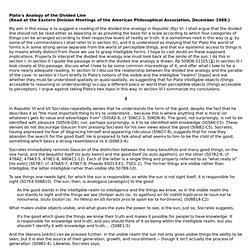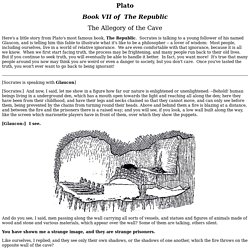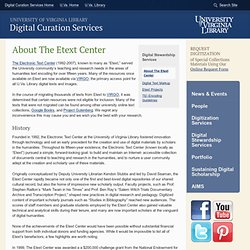

Public Domain. A. S. Kline, Ovid's METAMORPHOSES. Plato's Analogy of the Divided Line. Plato's Analogy of the Divided Line (Read at the Eastern Division Meetings of the American Philosophical Association, December 1988.)

My aim in this essay is to suggest a reading of the divided line analogy in Republic (Rp) VI. I shall argue that the divided line should not be read either as depicting or as providing the basis for a scale according to which four categories of things can be arranged according to their respective levels of reality or truth. It is sometimes read in this way (e.g. by some of the commentators I shall refer to in section III), and it is understood as implying that for Plato the world of forms is in some strong sense separate from the world of perceptible things, and that our epistemic access to things is by means wholly distinct from those we use to grasp intelligible forms.
I hope to cast doubt on these supposed implications. Plato's Cave. Plato Book VII of The Republic The Allegory of the Cave Here's a little story from Plato's most famous book, The Republic.

Socrates is talking to a young follower of his named Glaucon, and is telling him this fable to illustrate what it's like to be a philosopher -- a lover of wisdom: Most people, including ourselves, live in a world of relative ignorance. We are even comfortable with that ignorance, because it is all we know. [Socrates is speaking with Glaucon] [Socrates:] And now, I said, let me show in a figure how far our nature is enlightened or unenlightened: --Behold!
[Glaucon:] I see. And do you see, I said, men passing along the wall carrying all sorts of vessels, and statues and figures of animals made of wood and stone and various materials, which appear over the wall? You have shown me a strange image, and they are strange prisoners. True, he said; how could they see anything but the shadows if they were never allowed to move their heads? Yes, he said. Very true. That is certain. Philosophy 320: History of Ancient Philosophy. Marcus Aurelius: The Meditations. Men seek retreats for themselves, houses in the country, at the seashore, and in the mountains; and you tend to desire such things very much. But this is a characteristic of the most common sort of men, for it is in your power whenever you will to choose to retreat into yourself. For nowhere either with more quiet or more freedom from trouble does a man retreat than into his own soul, particularly when he has within him such thoughts that by looking into them he is immediately perfectly tranquil; and I affirm that tranquillity is nothing other than the proper ordering of the mind.
Do not act as if you were going to live ten thousand years. Death hangs over you. While you live, while it is in your power, be good. What is evil in you does not subsist in the ruling principle of another; nor in any part or transformation of your physical body. You are a little soul carrying about a corpse, as Epictetus used to say. The Republic by Plato. A. S. Kline, Ovid's METAMORPHOSES. The History of Rome, Vol. I. The Electronic Text Center (1992-2007), known to many as “Etext,” served the University community’s teaching and research needs in the areas of humanities text encoding for over fifteen years.

Many of the resources once available on Etext are now available via VIRGO, the primary access point for all U.Va. Library digital texts and images. In the course of migrating thousands of texts from Etext to VIRGO, it was determined that certain resources were not eligible for inclusion. Many of the texts that were not migrated can be found among other university online text collections, Google Books, and Project Gutenberg. We regret any inconvenience this may cause you and we wish you the best with your research. Founded in 1992, the Electronic Text Center at the University of Virginia Library fostered innovation through technology and set an early precedent for the creation and use of digital materials by scholars in the humanities.
The Baldwin Online Children's Literature Project...Bringing Yesterday's Classics to Today's Children.